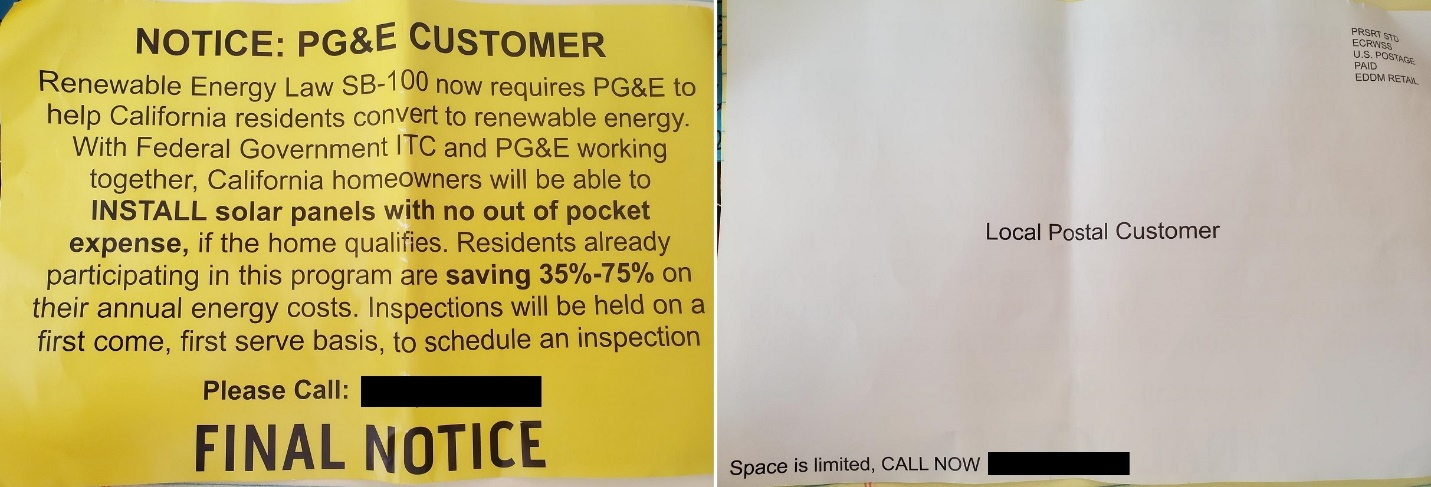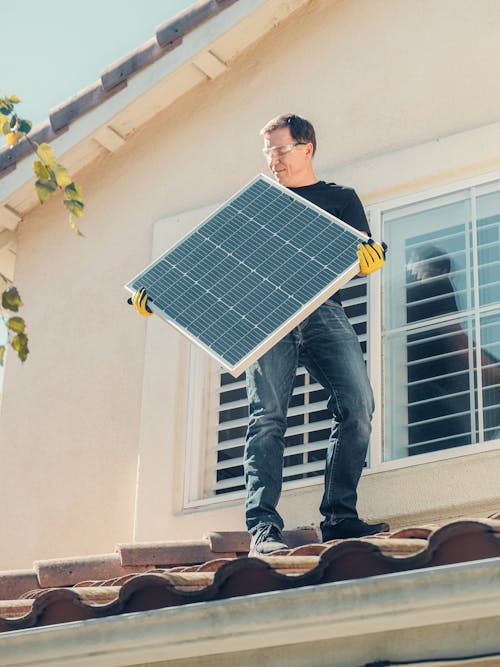
Business Consumer Alliance warns homeowners of misleading notices for no-cost solar and other contracting services. Notices are being distributed door-to-door, through flyers, mail, email, in ads, and by shifty salespeople offering no out of pocket expenses for certain contractor services. The misleading notices often cost homeowners greatly.

One example is the above mailer sent to California residents that falsely implies that the law requires the federal government and PG&E to provide solar for consumers “with no out of pocket expense.” The Senate Bill referenced (SB 100) is a policy requiring that renewable energy and zero-carbon resources supply 100 percent of electric retail sales to end-use customers by 2045. The bill does not provide consumers with free solar.
The misleading notices are ploys, used by some unscrupulous contractors, to lure in homeowners. They often use high-pressure sales tactics to convince homeowners to sign up with contractors for work they may not be able to afford. They use the guise that the services are “free”, “no-cost”, or “reimbursable,” which may not be true. These schemes often result with homeowners facing financial devastation. Homeowners may lose thousands of dollars to these scams. Many times homeowners are pressured to enter into contracts for overpriced solar systems, that they can’t afford, or they obtain a loan that pays the contractor directly for work that may not be performed or completed.

Consumers should take precautions when entering any contractual obligation. Always research any contractor you are thinking of hiring. Start by checking the business's reputation. Get a Reliability Report from BCA. Ensure that the business has the proper licensing required in your state and valid insurance. It’s recommended that you get at least three bids for any work you’re considering, as well as checking references. Get all promises, terms, and guarantees in writing and make sure to go over the contract carefully. Do not sign until you understand the agreement and never give in to high-pressure sales tactics. If you feel pressure, inform the business that you need time to consider the agreement.
Home improvements can be costly so it is important to do your research and know what you are purchasing, the terms of the service, and your payment obligations. If you believe you have encountered a home improvement scheme, file a complaint with BCA. You should also contact your state's regulatory agency and, when necessary, law enforcement. Share this information with others and follow BCA on Facebook for more scam advisories.
About Business Consumer Alliance
Business Consumer Alliance (BCA) is a non-profit company that started in 1928. The broad purpose of BCA is to promote business self-regulation. BCA's mission is achieved by assisting consumers in resolving complaints with businesses and using that complaint information, along with other relevant information such as customer reviews, to forecast business reliability. With community support, BCA can identify trustworthy and ethical businesses and warn the public to avoid unscrupulous businesses whose purpose is to defraud the marketplace. BCA also helps businesses promote themselves by providing services and tools to protect their business and reach out to their customers. BCA obtains its funding from member businesses who support the mission and purpose of the organization and who agree to abide by high standards of ethical business practices.